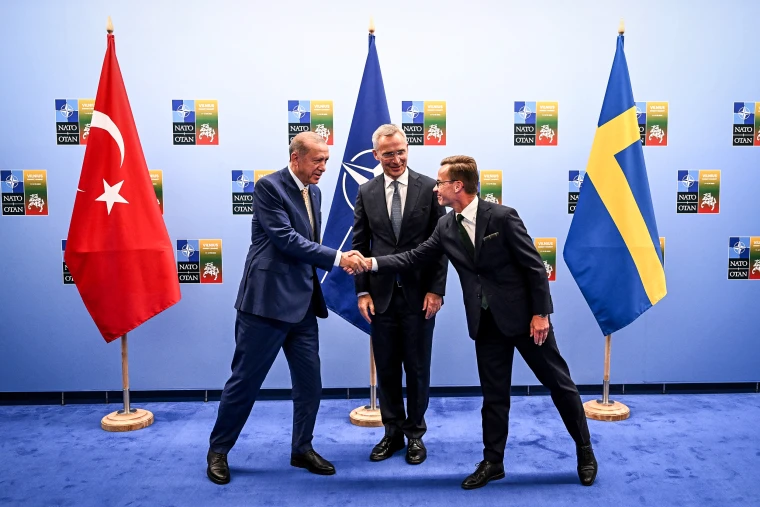In a historic move, Turkish legislators have officially endorsed Sweden’s membership in the North Atlantic Treaty Organization (NATO), marking a significant breakthrough in Sweden NATO bid to join the military alliance. The decision was reached after prolonged deliberations, with Turkey being the last major obstacle in the way of Sweden’s accession. The move underscores the evolving geopolitical dynamics in the wake of Russia’s invasion of Ukraine in 2022 and highlights the strategic realignment of nations seeking the security umbrella provided by NATO.
Legislative Approval
On January 24, 2024, Turkish legislators overwhelmingly ratified Sweden’s accession protocol by a vote of 287 to 55, with four abstentions. The ratification is expected to come into effect promptly after its publication in the Official Gazette. Notably, Hungary now stands as the sole NATO ally yet to ratify Sweden’s accession, complicating the unanimity required for expansion within the alliance.
Turkish Delays and Concerns
Turkey’s hesitance in endorsing Sweden NATO membership had persisted for over a year, with Ankara expressing concerns about Sweden’s perceived leniency towards groups that Turkey considers security threats. This includes demands for a more robust stance against Kurdish militants and individuals associated with the network Ankara holds responsible for the failed coup in 2016. Additionally, Turkey had been displeased by protests within Sweden, particularly those related to the outlawed Kurdistan Workers’ Party and Quran-burning demonstrations.
Foreign Affairs Committee and Diplomatic Efforts
Last month, the Turkish parliament’s foreign affairs committee gave its consent to Sweden’s bid, signaling a positive step in the legislative process. Turkish President Recep Tayyip Erdoğan’s efforts to secure concessions from Stockholm, including amendments to anti-terrorism laws and lifting restrictions on defense industry sales, were highlighted by Deputy Foreign Minister Burak Akçapar. In an attempt to address Turkish concerns, Sweden has pledged deeper cooperation on counterterrorism and support for Turkey’s ambitions to rekindle its European Union (EU) membership bid.
Political Landscape and Opposition
While Turkey’s main opposition party endorsed Sweden’s NATO membership, a center-right party and the pro-Kurdish party voiced opposition. Legislators, such as Müsavat Dervişoğlu from the Good Party, argued that Sweden’s efforts regarding the extradition of wanted criminals and counterterrorism measures remained limited and insufficient. This reflects the ongoing internal debate within Turkey over the perceived effectiveness of Sweden’s commitments to address Ankara’s security concerns.
Linkage to F-16 Sale and Diplomatic Maneuvering
President Erdoğan strategically linked the ratification of Sweden’s NATO membership to the U.S. Congress’ approval of Turkey’s request to purchase 40 new F-16 fighter jets and modernization kits for its existing fleet. While the Biden administration did not formally tie the F-16 sale to Sweden’s NATO membership, influential members of Congress indicated reluctance to support the sale without such approval. Turkish legislators, including Koray Aydin, emphasized the importance of using Sweden’s NATO bid as a bargaining chip until the F-16 sales and modernization kits were approved in Washington.
U.S. Administration’s Perspective
The Biden administration, through National Security Council spokesman John Kirby, expressed readiness for Sweden to become a NATO ally. Kirby emphasized Sweden’s modern and advanced military capabilities, asserting that the country would bring significant military capabilities to the alliance. This stance reflects the U.S. commitment to strengthening NATO with capable and strategic partners.
Sweden’s Strategic Pivot and Geopolitical Shift
Sweden’s decision to abandon its traditional policy of military nonalignment, alongside Finland, is a consequence of the changing geopolitical landscape in Europe, particularly following Russia’s invasion of Ukraine in 2022. Finland had already joined NATO in April, becoming the alliance’s 31st member after Turkish parliamentary approval. Sweden’s pivot underscores the perceived security benefits offered by NATO’s collective defense in the face of regional uncertainties.
Hungarian Objections and Diplomatic Outreach
Hungary, like Turkey, has been a stumbling block in Sweden’s NATO accession, citing concerns about alleged misinformation regarding Hungary’s democracy. Hungarian Prime Minister Viktor Orbán invited his Swedish counterpart, Ulf Kristersson, to Budapest for discussions on Sweden’s NATO entry. The timing and outcome of the Hungarian parliamentary vote remain uncertain, complicating the process of achieving unanimous approval from all NATO members.
Conclusion
As Turkey removes its objections to Sweden’s NATO membership, the geopolitical landscape in Europe continues to shift. The ratification by Turkish legislators is a significant step forward, but Hungary’s lingering objections present an additional hurdle. Sweden’s accession to NATO is emblematic of the changing dynamics in the region, emphasizing the strategic importance nations place on collective security amid evolving geopolitical challenges. The diplomatic maneuvers, linkages to defense deals, and internal debates within NATO member states illustrate the complex interplay of interests as the alliance navigates its expansion in a rapidly changing world.







